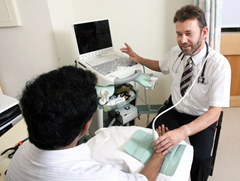McKinsey report
 A radical reform programme is needed to avoid damaging cuts, the hard- hitting McKinsey report states. agendaNi reviews its proposals.
A radical reform programme is needed to avoid damaging cuts, the hard- hitting McKinsey report states. agendaNi reviews its proposals.
Northern Ireland’s Health Service will run out of money in four years unless fundamental reforms take place. That is the main message from the McKinsey report, commissioned by the Health and Social Care Board.
Four trends, it found, are adding to the pressure on the system:
1. A growing and ageing population (50,000 more people by 2014, 17 per cent aged over 65);
2. Social and behavioural problems (less care within families, increasing drug and alcohol abuse, more patients with chronic conditions);
3. Changes in technology and practice (new treatments and improved diagnosis mean more activity within the system); and
4. Individuals having higher expectations.
The McKinsey report takes an objective, strategic overview. It presents “possible plans” for delivering “high quality, cost effective health and social care services for Northern Ireland”.
A high quality service is defined as effective, safe, serving all of society, and patient- or user-centred. A productive service, it adds, “makes efficient use of all resources, including facilities, staff and supplies.”
Without change, the running costs will rise from £4.3 billion to £5.4 billion by 2014-2015. However, the report claims that £600 million can be saved from this sum: £100 million from optimising the quantity and type of care and £500 million from reducing the unit cost of care.
A reformed system would involve:
• primary care centres acting as “hubs” for health and social care in the community with integrated staff teams (open for 12-16 hours per day, seven days a week); and
• fewer acute hospitals, supported by local hospitals providing local access to urgent care services.
McKinsey puts the one-off transition cost at £280 million (including £45 million capital investment to upgrade primary care centres).
The Health Service is already underfunded, spending 7-16 per cent less per capita than its English equivalent. Depending on the estimate, the province needs £226-606 million to catch up. That gap opened up in 2009-2010 as funding increased at a faster rate in Great Britain.
Past improvements are praised. Northern Ireland’s life expectancy is increasing. Healthcare-acquired infections, such as MRSA, have declined.
The province still has a shorter life expectancy and more deprivation than England and our mental health and learning disability services receive less than half of the English per capita spend. Coronary heart disease, smoking and obesity are more prevalent.
North East England was selected to provide a more accurate comparison as it has similar levels of deprivation. In 2008-2009, Northern Ireland spent proportionally more on hospital services and community prescribing.
“Doing nothing is clearly not an option” but the report also rejects the popular notion that cutting back on management will solve the problem. Administration only makes up 7 per cent of the health budget and the Review of Public Administration has already made most of the possible savings (£48 million).
Recommended improvements include:
• Allowing for a few weeks’ intensive rehabilitation before assessing someone for social care;
• Ending “clinically ineffective or non- essential treatments” (e.g. aesthetic ENT surgery);
• Making better use of minor injuries units instead of A&E; and
• Increasing the use of generic drugs.
Under this model, there would be 358 fewer hospital beds, a 30 per cent reduction in hospital outpatient appointments and 21 per cent more GP consultations, over a timescale from 2008-2009 to 2014-2015. Staff numbers would reduce by 1,000 and would otherwise increase by 10,000 or more.
Strong leadership is required from ministers, MLAs, managers, senior professionals and the unions.
Changes must be communicated clearly before implementation. The wide audience includes patients, clients and their communities, the media and all staff.
If savings are not realised, more radical options “may need to be considered” to close the funding gap.
The most controversial proposal is “co-payment” by the service user. Initially, this could mean bringing Northern Ireland into line with England e.g. ending free prescriptions and charging for community care. Extra steps could involve charges for attending A&E, GP appointments or inpatient stays.
Co-payment could generate £140-302 million but must be carefully designed as people who need care may be discouraged from coming forward. The Republic has exemptions for medical card holders and patients with infectious diseases.
If further reductions were necessary, the Minister would have to consider serious restrictions on services e.g. means- testing and hip replacements only for the over 80s. This draconian last resort could be legally challenged but is described to highlight the risks of doing nothing.
Edwin Poots gave his initial assessment to the Assembly’s Health Committee on 8 June. The report provided “firm evidence of scope for greater productivity while delivering cash-releasing efficiencies”. He added: “That is not to say that I would adopt all of the policies or proposals in the McKinsey report. I will not, because some of them are off the wall. However, as others are practical and sensible, we will treat [its] proposals as an à-la-carte menu.”





